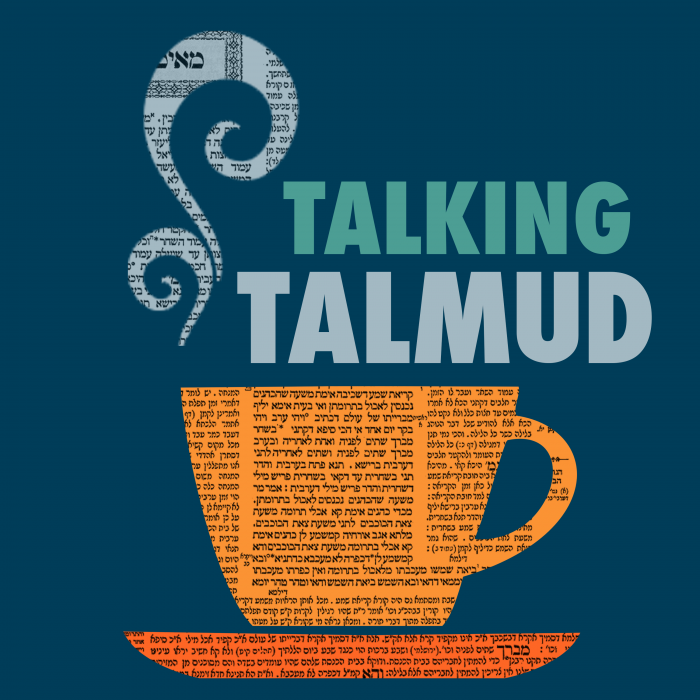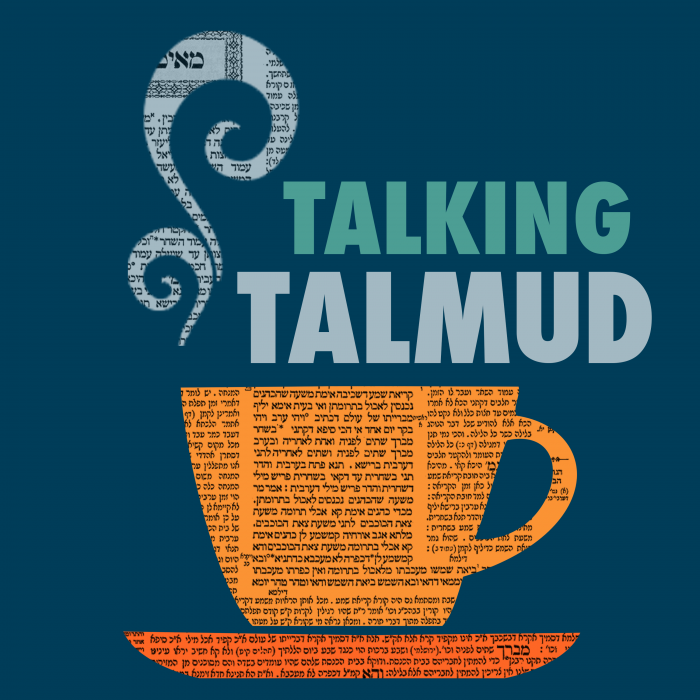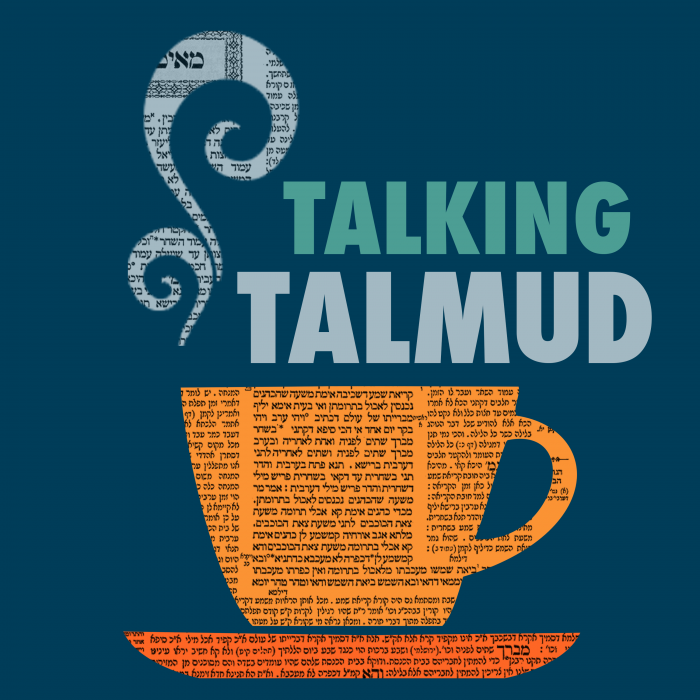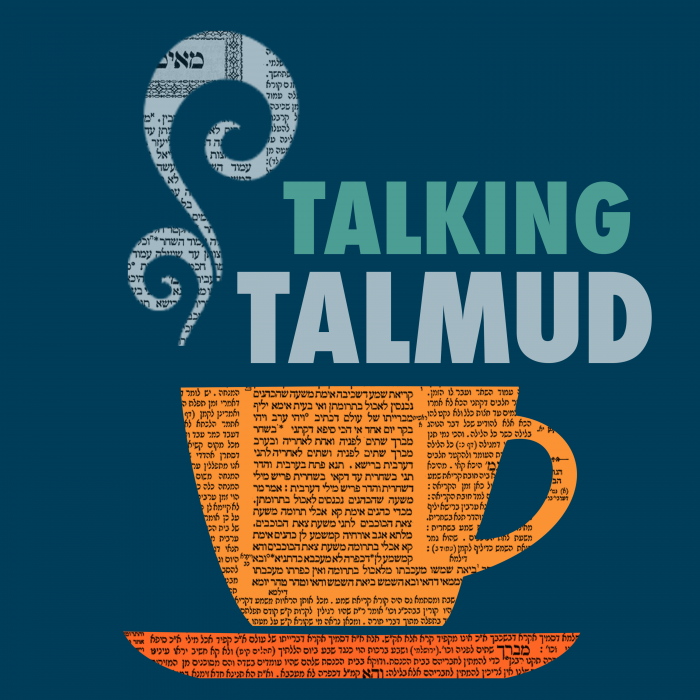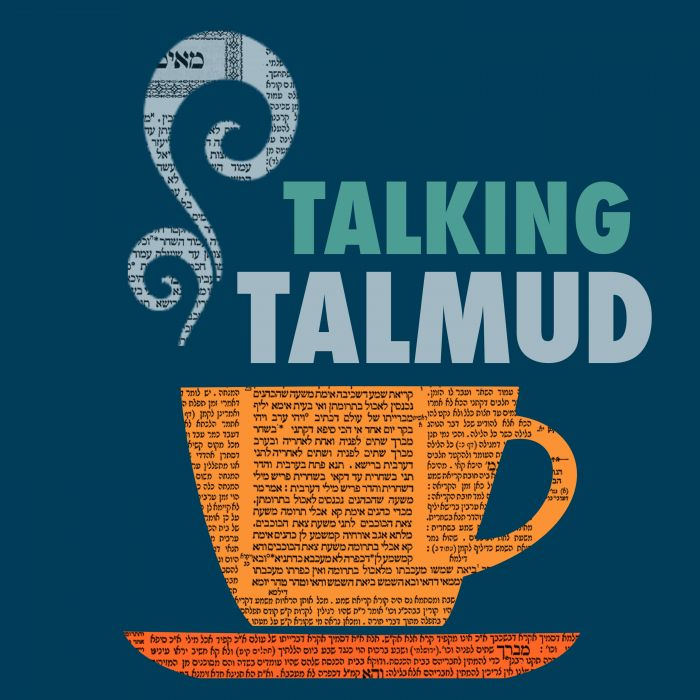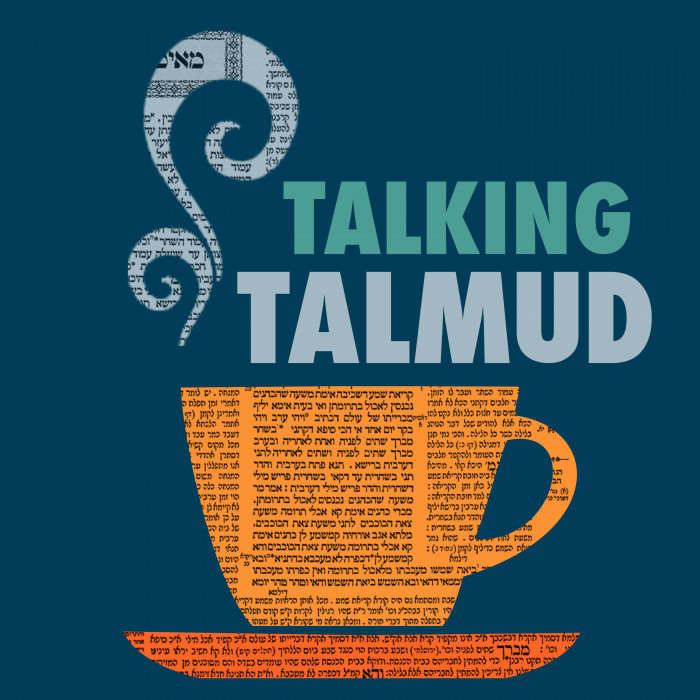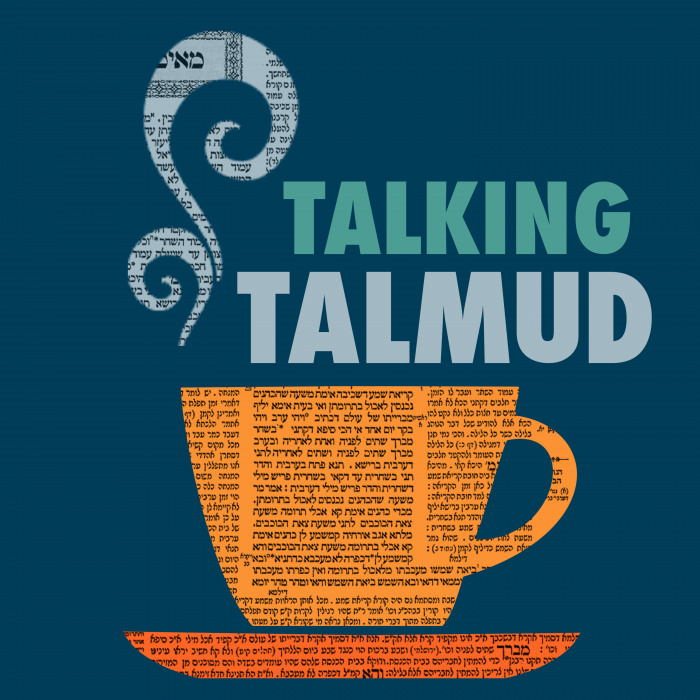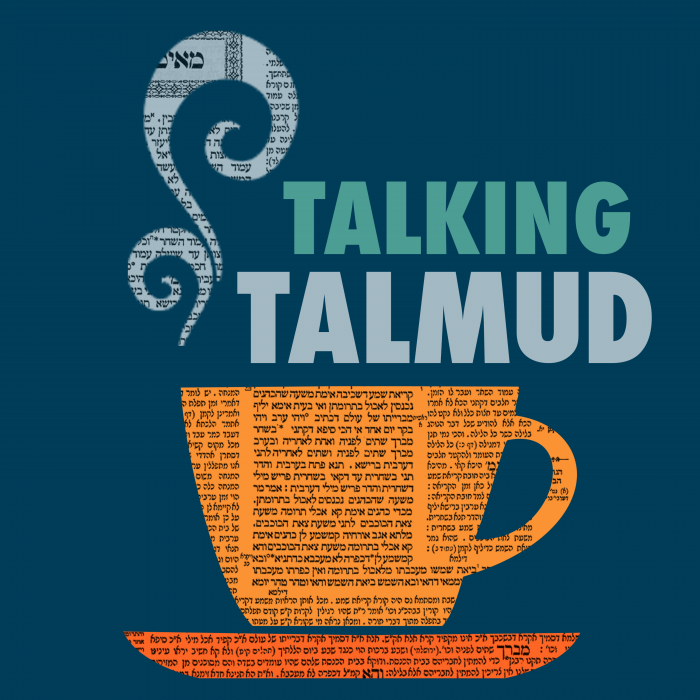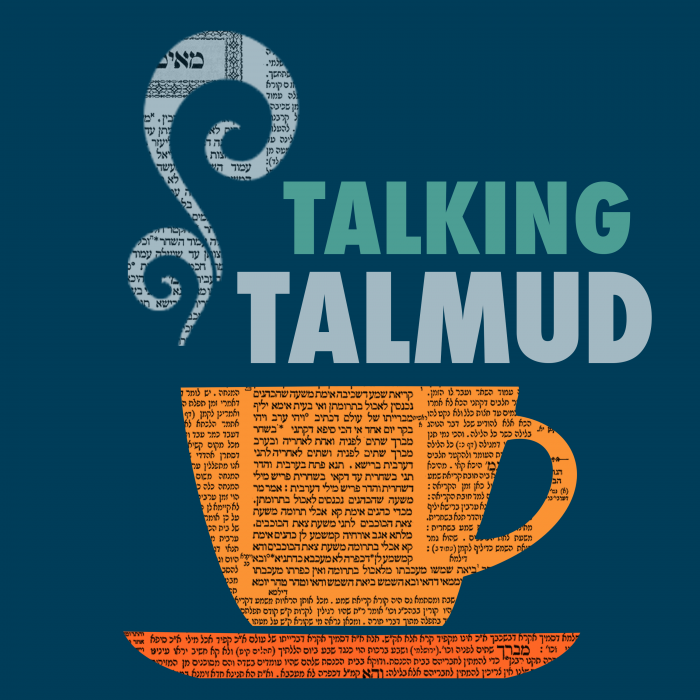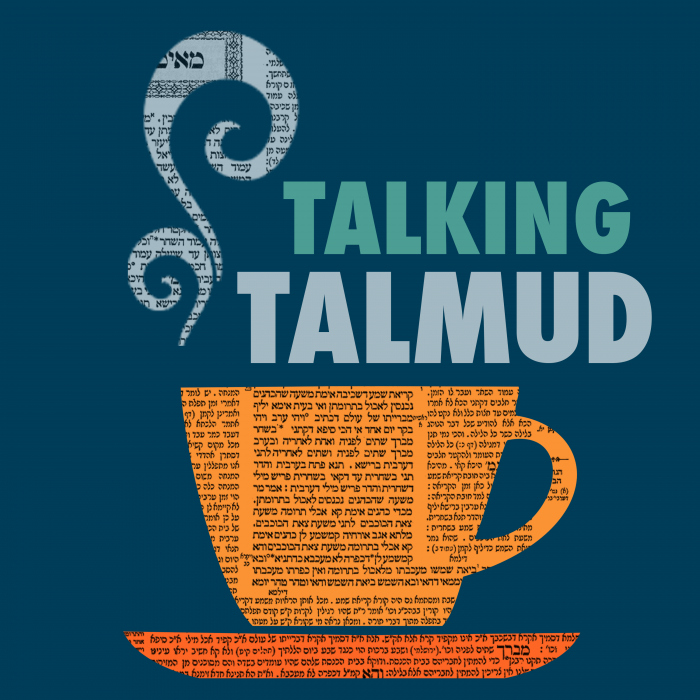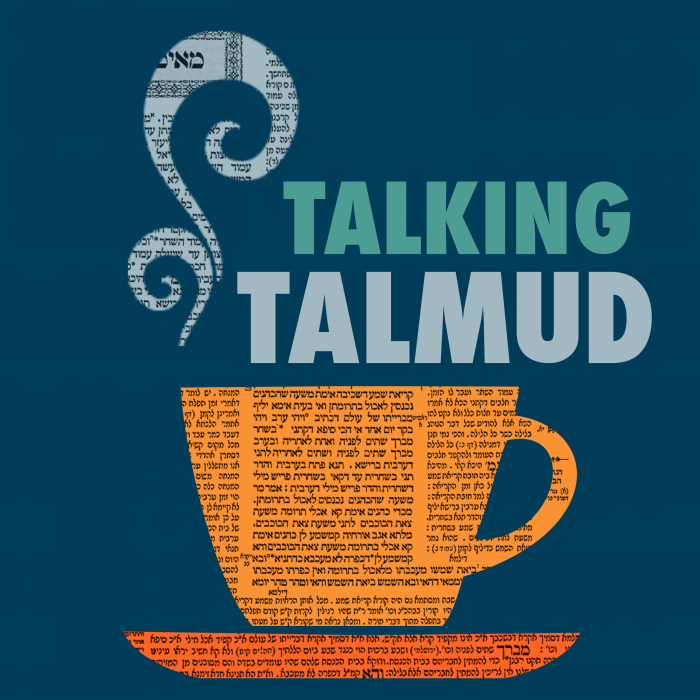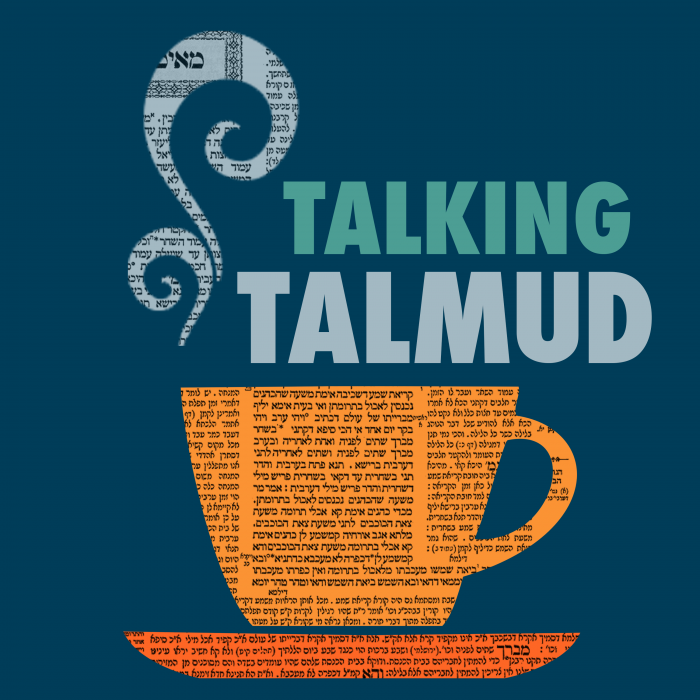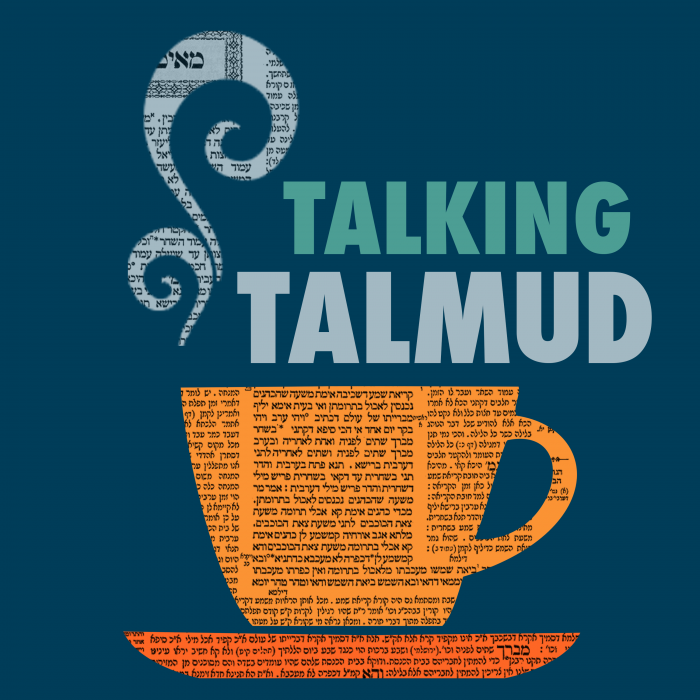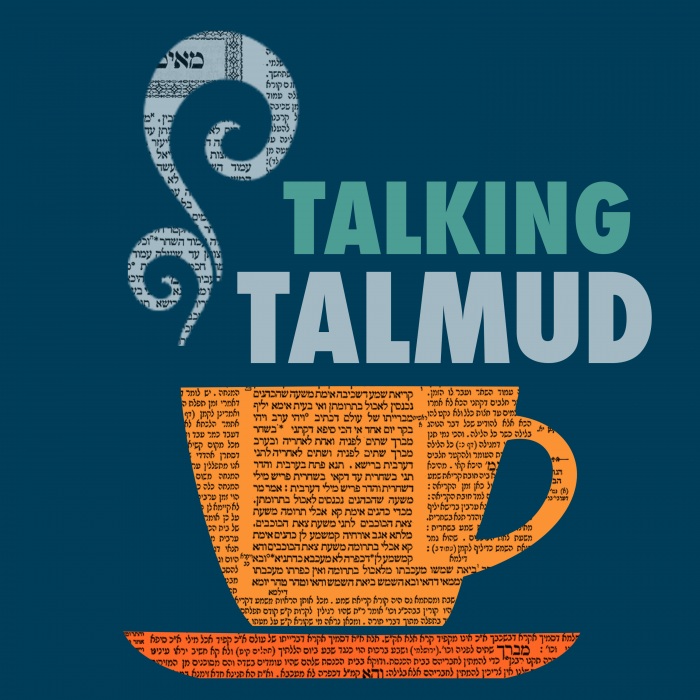There is a debate regarding whether one who experienced a seminal emission can learn some types of Torah, none at all, or all kinds? Was the takana of Ezra entirely cancelled? Does he need to go in a mikveh with 40 se’ah or can one pour nine kav of water. What does one do if one is in the middle of tefilla or reading from the Torah and one remembers that one has impurity from a seminal emission?
This week’s learning is sponsored by Nira Feldman in loving memory of her mother, Faye Darack Z’L 3rd yahrzeit. “She was a dedicated Hadran learner and continues to inspire us with her curiosity and love of learning each day. We miss her deeply.”
Want to dedicate learning? Get started here:


Today’s daily daf tools:
This week’s learning is sponsored by Nira Feldman in loving memory of her mother, Faye Darack Z’L 3rd yahrzeit. “She was a dedicated Hadran learner and continues to inspire us with her curiosity and love of learning each day. We miss her deeply.”
Today’s daily daf tools:
Delve Deeper
Broaden your understanding of the topics on this daf with classes and podcasts from top women Talmud scholars.
New to Talmud?
Check out our resources designed to help you navigate a page of Talmud – and study at the pace, level and style that fits you.
The Hadran Women’s Tapestry
Meet the diverse women learning Gemara at Hadran and hear their stories.
Berakhot 22
מְשַׁמֶּשֶׁת וְרָאֲתָה נִדָּה — אֵינָהּ צְרִיכָה טְבִילָה, אֲבָל בַּעַל קֶרִי גְּרֵידָא — מְחַיַּיב. לָא תֵּימָא ״מְבָרֵךְ״, אֶלָּא מְהַרְהֵר.
that a woman who engaged in intercourse and saw menstrual blood is not required to immerse herself, but one who experienced a seminal emission alone, with no concurrent impurity, is required to do so? If so, we must interpret Rabbi Yehuda’s statement in the mishna that one recites a blessing both beforehand and thereafter as follows: Do not say that one recites a blessing orally, but rather he means that one contemplates those blessings in his heart.
וּמִי אִית לֵיהּ לְרַבִּי יְהוּדָה הִרְהוּר? וְהָתַנְיָא: בַּעַל קֶרִי שֶׁאֵין לוֹ מַיִם לִטְבּוֹל — קוֹרֵא קְרִיאַת שְׁמַע, וְאֵינוֹ מְבָרֵךְ, לֹא לְפָנֶיהָ וְלֹא לְאַחֲרֶיהָ. וְאוֹכֵל פִּתּוֹ וּמְבָרֵךְ לְאַחֲרֶיהָ, וְאֵינוֹ מְבָרֵךְ לְפָנֶיהָ. אֲבָל מְהַרְהֵר בְּלִבּוֹ וְאֵינוֹ מוֹצִיא בִּשְׂפָתָיו, דִּבְרֵי רַבִּי מֵאִיר. רַבִּי יְהוּדָה אוֹמֵר: בֵּין כָּךְ וּבֵין כָּךְ מוֹצִיא בִּשְׂפָתָיו.
The Gemara challenges this explanation: And does Rabbi Yehuda maintain that there is validity to contemplating in his heart? Wasn’t it taught in a baraita: One who experienced a seminal emission and who has no water to immerse and purify himself recites Shema and neither recites the blessings of Shema beforehand nor thereafter? And when he eats his bread, he recites the blessing thereafter, Grace after Meals, but does not recite the blessing: Who brings forth bread from the earth, beforehand. However, in the instances where he may not recite the blessing, he contemplates it in his heart rather than utter it with his lips, this is the statement of Rabbi Meir. However Rabbi Yehuda says: In either case, he utters all of the blessings with his lips. Rabbi Yehuda does not consider contemplating the blessings in his heart a solution and permits them to be recited.
אָמַר רַב נַחְמָן בַּר יִצְחָק: עֲשָׂאָן רַבִּי יְהוּדָה כְּהִלְכוֹת דֶּרֶךְ אֶרֶץ.
Rav Naḥman bar Yitzḥak said: Rabbi Yehuda’s statement in the mishna should be interpreted in another way. Rabbi Yehuda rendered the blessings like Hilkhot Derekh Eretz, which according to some Sages were not considered to be in the same category as all other matters of Torah and therefore, one is permitted to engage in their study even after having experienced a seminal emission.
דְּתַנְיָא: ״וְהוֹדַעְתָּם לְבָנֶיךָ וְלִבְנֵי בָנֶיךָ״, וּכְתִיב בָּתְרֵיהּ ״יוֹם אֲשֶׁר עָמַדְתָּ לִפְנֵי ה׳ אֱלֹהֶיךָ בְּחוֹרֵב״, מָה לְהַלָּן בְּאֵימָה וּבְיִרְאָה וּבִרְתֵת וּבְזִיעַ, אַף כָּאן בְּאֵימָה וּבְיִרְאָה וּבִרְתֵת וּבְזִיעַ.
As it was taught in a baraita: It is written: “And you shall impart them to your children and your children’s children” (Deuteronomy 4:9), and it is written thereafter: “The day that you stood before the Lord your God at Horeb” (Deuteronomy 4:10). Just as below, the Revelation at Sinai was in reverence, fear, quaking, and trembling, so too here, in every generation, Torah must be studied with a sense of reverence, fear, quaking, and trembling.
מִכָּאן אָמְרוּ: הַזָּבִים וְהַמְצֹרָעִים וּבָאִין עַל נִדּוֹת — מוּתָּרִים לִקְרוֹת בַּתּוֹרָה וּבַנְּבִיאִים וּבַכְּתוּבִים, לִשְׁנוֹת בַּמִּשְׁנָה וּגְמָרָא וּבָהֲלָכוֹת וּבָאַגָּדוֹת. אֲבָל בַּעֲלֵי קְרָיִין אֲסוּרִים.
From here the Sages stated: Zavim, lepers, and those who engaged in intercourse with menstruating women, despite their severe impurity, are permitted to read the Torah, Prophets, and Writings, and to study Mishna and Gemara and halakhot and aggada. However, those who experienced a seminal emission are prohibited from doing so. The reason for this distinction is that the cases of severe impurity are caused by ailment or other circumstances beyond his control and, as a result, they do not necessarily preclude a sense of reverence and awe as he studies Torah. This, however, is not the case with regard to impurity resulting from a seminal emission, which usually comes about due to frivolity and a lack of reverence and awe. Therefore, it is inappropriate for one who experiences a seminal emission to engage in matters of in Torah.
רַבִּי יוֹסֵי אוֹמֵר: שׁוֹנֶה הוּא בָּרְגִילִיּוֹת, וּבִלְבַד שֶׁלֹּא יַצִּיעַ אֶת הַמִּשְׁנָה. רַבִּי יוֹנָתָן בֶּן יוֹסֵף אוֹמֵר: מַצִּיעַ הוּא אֶת הַמִּשְׁנָה, וְאֵינוֹ מַצִּיעַ אֶת הַגְּמָרָא. רַבִּי נָתָן בֶּן אֲבִישָׁלוֹם אוֹמֵר: אַף מַצִּיעַ אֶת הַגְּמָרָא, וּבִלְבַד שֶׁלֹּא יֹאמַר אַזְכָּרוֹת שֶׁבּוֹ. רַבִּי יוֹחָנָן הַסַּנְדְּלָר תַּלְמִידוֹ שֶׁל רַבִּי עֲקִיבָא מִשּׁוּם רַבִּי עֲקִיבָא אוֹמֵר: לֹא יִכָּנֵס לַמִּדְרָשׁ כׇּל עִיקָּר. וְאָמְרִי לַהּ: לֹא יִכָּנֵס לְבֵית הַמִּדְרָשׁ כׇּל עִיקָּר. רַבִּי יְהוּדָה אוֹמֵר: שׁוֹנֶה הוּא בְּהִלְכוֹת דֶּרֶךְ אֶרֶץ.
However, there are many opinions concerning the precise parameters of the Torah matters prohibited by this decree. Rabbi Yosei says: One who experiences a seminal emission studies mishnayot that he is accustomed to study, as long as he does not expound upon a new mishna to study it in depth. Rabbi Yonatan ben Yosef says: He expounds upon the mishna but he does not expound upon the Gemara, which is the in-depth analysis of the Torah. Rabbi Natan ben Avishalom says: He may even expound upon the Gemara, as long as he does not utter the mentions of God’s name therein. Rabbi Yoḥanan the Cobbler, Rabbi Akiva’s student, says in the name of Rabbi Akiva: One who experiences a seminal emission may not enter into homiletic interpretation [midrash] of verses at all. Some say that he says: He may not enter the study hall [beit hamidrash] at all. Rabbi Yehuda says: He may study only Hilkhot Derekh Eretz. In terms of the problem raised above, apparently Rabbi Yehuda considers the legal status of the blessings to be parallel to the legal status of Hilkhot Derekh Eretz, and therefore one may utter them orally.
מַעֲשֶׂה בְּרַבִּי יְהוּדָה שֶׁרָאָה קֶרִי, וְהָיָה מְהַלֵּךְ עַל גַּב הַנָּהָר. אָמְרוּ לוֹ תַּלְמִידָיו: רַבֵּינוּ, שְׁנֵה לָנוּ פֶּרֶק אֶחָד בְּהִלְכוֹת דֶּרֶךְ אֶרֶץ. יָרַד וְטָבַל וְשָׁנָה לָהֶם. אָמְרוּ לוֹ: לֹא כָּךְ לִמַּדְתָּנוּ רַבֵּינוּ, שׁוֹנֶה הוּא בְּהִלְכוֹת דֶּרֶךְ אֶרֶץ?! אָמַר לָהֶם: אַף עַל פִּי שֶׁמֵּיקֵל אֲנִי עַל אֲחֵרִים, מַחְמִיר אֲנִי עַל עַצְמִי.
The Gemara relates an incident involving Rabbi Yehuda himself, who experienced a seminal emission and was walking along the riverbank with his disciples. His disciples said to him: Rabbi, teach us a chapter from Hilkhot Derekh Eretz, as he maintained that even in a state of impurity, it is permitted. He descended and immersed himself in the river and taught them Hilkhot Derekh Eretz. They said to him: Did you not teach us, our teacher, that he may study Hilkhot Derekh Eretz? He said to them: Although I am lenient with others, and allow them to study it without immersion, I am stringent with myself.
תַּנְיָא, רַבִּי יְהוּדָה בֶּן בְּתֵירָא הָיָה אוֹמֵר: אֵין דִּבְרֵי תוֹרָה מְקַבְּלִין טוּמְאָה. מַעֲשֶׂה בְּתַלְמִיד אֶחָד שֶׁהָיָה מְגַמְגֵּם לְמַעְלָה מֵרַבִּי יְהוּדָה בֶּן בְּתֵירָא. אָמַר לֵיהּ: בְּנִי, פְּתַח פִּיךָ וְיָאִירוּ דְבָרֶיךָ, שֶׁאֵין דִּבְרֵי תוֹרָה מְקַבְּלִין טוּמְאָה, שֶׁנֶּאֱמַר: ״הֲלֹא כֹה דְבָרִי כָּאֵשׁ נְאֻם ה׳״, מָה אֵשׁ אֵינוֹ מְקַבֵּל טוּמְאָה אַף דִּבְרֵי תוֹרָה אֵינָן מְקַבְּלִין טוּמְאָה.
Further elaborating on the issue of Torah study while in a state of impurity, it was taught in a baraita that Rabbi Yehuda ben Beteira would say: Matters of Torah do not become ritually impure and therefore one who is impure is permitted to engage in Torah study. He implemented this halakha in practice. The Gemara relates an incident involving a student who was reciting mishnayot and baraitot hesitantly before the study hall of Rabbi Yehuda ben Beteira. The student experienced a seminal emission, and when he was asked to recite he did so in a rushed, uneven manner, as he did not want to utter the words of Torah explicitly. Rabbi Yehuda said to him: My son, open your mouth and let your words illuminate, as matters of Torah do not become ritually impure, as it is stated: “Is not my word like fire, says the Lord” (Jeremiah 23:29). Just as fire does not become ritually impure, so too matters of Torah do not become ritually impure.
אָמַר מָר. מַצִּיעַ אֶת הַמִּשְׁנָה וְאֵינוֹ מַצִּיעַ אֶת הַגְּמָרָא. מְסַיַּיע לֵיהּ לְרַבִּי אִלְעַאי, דְּאָמַר רַבִּי אִלְעַאי אָמַר רַבִּי אַחָא בַּר יַעֲקֹב מִשּׁוּם רַבֵּינוּ: הֲלָכָה, מַצִּיעַ אֶת הַמִּשְׁנָה וְאֵינוֹ מַצִּיעַ אֶת הַגְּמָרָא. כְּתַנָּאֵי: מַצִּיעַ אֶת הַמִּשְׁנָה וְאֵינוֹ מַצִּיעַ אֶת הַגְּמָרָא, דִּבְרֵי רַבִּי מֵאִיר. רַבִּי יְהוּדָה בֶּן גַּמְלִיאֵל אוֹמֵר מִשּׁוּם רַבִּי חֲנִינָא בֶּן גַּמְלִיאֵל: זֶה וָזֶה אָסוּר. וְאָמְרִי לַהּ: זֶה וָזֶה מוּתָּר.
In this baraita the Master said that one who is impure because of a seminal emission expounds upon the mishna but does not expound upon the Gemara. The Gemara notes: This statement supports the opinion of Rabbi El’ai, as Rabbi El’ai said that Rabbi Aḥa bar Ya’akov said in the name of Rabbeinu, Rav: The halakha is that one who experienced a seminal emission may expound upon the mishna but may not expound upon the Gemara. This dispute is parallel a tannaitic dispute, as it was taught: One who experienced a seminal emission expounds upon the mishna but does not expound upon the Gemara; that is the statement of Rabbi Meir. Rabbi Yehuda ben Gamliel says in the name of Rabbi Ḥanina ben Gamliel: Both this and that are prohibited. And some say that he said: Both this and that are permitted.
מַאן דְּאָמַר זֶה וָזֶה אָסוּר — כְּרַבִּי יוֹחָנָן הַסַּנְדְּלָר, מַאן דְּאָמַר זֶה וָזֶה מוּתָּר — כְּרַבִּי יְהוּדָה בֶּן בְּתֵירָא.
Comparing these opinions: The one who said that both this and that are prohibited holds in accordance with the opinion of Rabbi Yoḥanan the Cobbler; the one who said that both this and that are permitted holds in accordance with the opinion of Rabbi Yehuda ben Beteira.
אָמַר רַב נַחְמָן בַּר יִצְחָק: נְהוּג עָלְמָא כְּהָנֵי תְּלָת סָבֵי — כְּרַבִּי אִלְעַאי בְּרֵאשִׁית הַגֵּז, כְּרַבִּי יֹאשִׁיָּה בְּכִלְאַיִם, כְּרַבִּי יְהוּדָה בֶּן בְּתֵירָא בְּדִבְרֵי תוֹרָה.
Summarizing the halakha, Rav Naḥman bar Yitzḥak said: The universally accepted practice is in accordance with the opinions of these three elders: In accordance with the opinion of Rabbi El’ai with regard to the halakhot of the first shearing, in accordance with the opinion of Rabbi Yoshiya with regard to the laws of prohibited diverse kinds, and in accordance with the opinion of Rabbi Yehuda ben Beteira with regard to matters of Torah.
כְּרַבִּי אִלְעַאי בְּרֵאשִׁית הַגֵּז — דְּתַנְיָא, רַבִּי אִלְעַאי אוֹמֵר: רֵאשִׁית הַגֵּז אֵינוֹ נוֹהֵג אֶלָּא בָּאָרֶץ.
The Gemara elaborates: In accordance with the opinion of Rabbi El’ai with regard to the first shearing, as it was taught in a baraita that Rabbi El’ai says: The obligation to set aside the first shearing from the sheep for the priest is only practiced in Eretz Yisrael and not in the Diaspora, and that is the accepted practice.
כְּרַבִּי יֹאשִׁיָּה בְּכִלְאַיִם, כְּדִכְתִיב: ״לֹא תִזְרַע כַּרְמְךָ כִּלְאָיִם״, רַבִּי יֹאשִׁיָּה אוֹמֵר: לְעוֹלָם אֵינוֹ חַיָּיב עַד שֶׁיִּזְרַע חִטָּה וּשְׂעוֹרָה וְחַרְצָן בְּמַפּוֹלֶת יָד.
In accordance with the opinion of Rabbi Yoshiya with regard to diverse kinds, as it is written: “You shall not sow your vineyard with diverse kinds” (Deuteronomy 22:9). Rabbi Yoshiya says: This means that one who sows diverse kinds is not liable by Torah law until he sows wheat and barley and a grape pit with a single hand motion, meaning that while sowing in the vineyard he violates the prohibition of diverse kinds that applies to seeds and to the vineyard simultaneously.
כְּרַבִּי יְהוּדָה בֶּן בְּתֵירָא בְּדִבְרֵי תוֹרָה, דְּתַנְיָא, רַבִּי יְהוּדָה בֶּן בְּתֵירָא אוֹמֵר: אֵין דִּבְרֵי תוֹרָה מְקַבְּלִין טוּמְאָה.
In accordance with Rabbi Yehuda ben Beteira with regard to one who experiences a seminal emission is permitted to engage in matters of Torah, as it was taught in a baraita that Rabbi Yehuda ben Beteira says: Matters of Torah do not become ritually impure.
כִּי אֲתָא זְעֵירִי, אֲמַר: בַּטְּלוּהָ לִטְבִילוּתָא. וְאָמְרִי לַהּ: בַּטְּלוּהָ לִנְטִילוּתָא. מַאן דְּאָמַר בַּטְּלוּהָ לִטְבִילוּתָא — כְּרַבִּי יְהוּדָה בֶּן בְּתֵירָא. מַאן דְּאָמַר בַּטְּלוּהָ לִנְטִילוּתָא — כִּי הָא דְּרַב חִסְדָּא לָיֵיט אַמַּאן דִּמְהַדַּר אַמַּיָּא בְּעִידָּן צְלוֹתָא.
And the Gemara relates: When Ze’iri came from Eretz Yisrael to Babylonia, he succinctly capsulated this halakha and said: They abolished ritual immersion, and some say that he said: They abolished ritual washing of the hands. The Gemara explains: The one who says that they abolished immersion holds in accordance with the opinion of Rabbi Yehuda ben Beteira that one who experienced a seminal emission is not required to immerse. And the one who says that they abolished washing of the hands holds in accordance with that which Rav Ḥisda cursed one who goes out of his way to seek water at the time of prayer.
תָּנוּ רַבָּנַן: בַּעַל קֶרִי שֶׁנָּתְנוּ עָלָיו תִּשְׁעָה קַבִּין מַיִם — טָהוֹר. נַחוּם אִישׁ גַּם זוֹ לְחָשָׁהּ לְרַבִּי עֲקִיבָא, וְרַבִּי עֲקִיבָא לְחָשָׁהּ לְבֶן עַזַּאי, וּבֶן עַזַּאי יָצָא וּשְׁנָאָהּ לְתַלְמִידָיו בְּשׁוּק. פְּלִיגִי בַּהּ תְּרֵי אָמוֹרָאֵי בְּמַעְרְבָא, רַבִּי יוֹסֵי בַּר אָבִין וְרַבִּי יוֹסֵי בַּר זְבִידָא. חַד תָּנֵי: שְׁנָאָהּ, וְחַד תָּנֵי: לְחָשָׁהּ.
The Sages taught in a baraita: One who experienced a seminal emission who had nine kav of drawn water poured over him, that is sufficient to render him ritually pure and he need not immerse himself in a ritual bath. The Gemara relates: Naḥum of Gam Zo whispered this halakha to Rabbi Akiva, and Rabbi Akiva whispered it to his student ben Azzai, and ben Azzai went out and taught it to his students publicly in the marketplace. Two amora’im in Eretz Yisrael, Rabbi Yosei bar Avin and Rabbi Yosei bar Zevida, disagreed as to the correct version of the conclusion of the incident. One taught: Ben Azzai taught it to his students in the market. And the other taught: Ben Azzai also whispered it to his students.
מַאן דְּתָנֵי שְׁנָאָהּ, מִשּׁוּם בִּטּוּל תּוֹרָה וּמִשּׁוּם בִּטּוּל פְּרִיָּה וּרְבִיָּה. וּמַאן דְּתָנֵי לְחָשָׁהּ — שֶׁלֹּא יְהוּ תַּלְמִידֵי חֲכָמִים מְצוּיִים אֵצֶל נְשׁוֹתֵיהֶם כְּתַרְנְגוֹלִים.
The Gemara explains the rationale behind the two versions of this incident. The Sage who taught that ben Azzai taught the law openly in the market held that the leniency was due to concern that the halakhot requiring ritual immersion would promote dereliction in the study of Torah. The ruling of Rabbi Yehuda ben Beteira eases the way for an individual who experienced a seminal emission to study Torah. This was also due to concern that the halakhot requiring ritual immersion would promote the suspension of procreation, as one might abstain from marital relations to avoid the immersion required thereafter. And the Sage, who taught that ben Azzai only whispered this halakha to his students, held that he did so in order that Torah scholars would not be with their wives like roosters. If the purification process was that simple, Torah scholars would engage in sexual activity constantly, which would distract them from their studies.
אָמַר רַבִּי יַנַּאי: שָׁמַעְתִּי שֶׁמְּקִילִּין בָּהּ וְשָׁמַעְתִּי שֶׁמַּחֲמִירִין בָּהּ, וְכׇל הַמַּחֲמִיר בָּהּ עַל עַצְמוֹ מַאֲרִיכִין לוֹ יָמָיו וּשְׁנוֹתָיו.
With regard to this ritual immersion, Rabbi Yannai said: I heard that there are those who are lenient with regard to it and I have heard that there are those who are stringent with regard to it. The halakha in this matter was never conclusively established and anyone who accepts upon himself to be stringent with regard to it, they prolong for him his days and years.
אָמַר רַבִּי יְהוֹשֻׁעַ בֶּן לֵוִי: מַה טִּיבָן שֶׁל טוֹבְלֵי שְׁחָרִין? מַה טִּיבָן?! הָא אִיהוּ דְּאָמַר בַּעַל קֶרִי אָסוּר בְּדִבְרֵי תּוֹרָה. הָכִי קָאָמַר: מַה טִּיבָן בְּאַרְבָּעִים סְאָה, אֶפְשָׁר בְּתִשְׁעָה קַבִּין. מַה טִּיבָן בִּטְבִילָה, אֶפְשָׁר בִּנְתִינָה.
The Gemara relates that Rabbi Yehoshua ben Levi said: What is the essence of those who immerse themselves in the morning? The Gemara retorts: How can one ask what is their essence? Isn’t he the one who said that one who experiences a seminal emission is prohibited from engaging in matters of Torah and is required to immerse himself in the morning? Rather, this is what he meant to say: What is the essence of immersion in a ritual bath of forty se’a of water when it is possible to purify oneself with nine kav? Furthermore, what is the essence of immersion when it is also possible to purify oneself by pouring water?
אָמַר רַבִּי חֲנִינָא: גָּדֵר גָּדוֹל גָּדְרוּ בָּהּ. דְּתַנְיָא: מַעֲשֶׂה בְּאֶחָד שֶׁתָּבַע אִשָּׁה לִדְבַר עֲבֵירָה. אָמְרָה לוֹ: רֵיקָא! יֵשׁ לְךָ אַרְבָּעִים סְאָה שֶׁאַתָּה טוֹבֵל בָּהֶן? מִיָּד פֵּירַשׁ.
Regarding this, Rabbi Ḥanina said: They established a massive fence protecting one from sinning with their decree that one must immerse himself in forty se’a of water. As it was taught in a baraita: There was an incident involving one who solicited a woman to commit a sinful act. She said to him: Good-for-nothing. Do you have forty se’a in which to immerse and purify yourself afterwards? He immediately desisted. The obligation to immerse oneself caused individuals to refrain from transgression.
אֲמַר לְהוּ רַב הוּנָא לְרַבָּנָן: רַבּוֹתַי, מִפְּנֵי מָה אַתֶּם מְזַלְזְלִין בִּטְבִילָה זוֹ: אִי מִשּׁוּם צִינָּה, אֶפְשָׁר בְּמֶרְחֲצָאוֹת.
Rav Huna said to the Sages: Gentlemen, why do you disdain this immersion? If it is because it is difficult for you to immerse in the cold waters of the ritual bath, it is possible to purify oneself by immersing oneself in the heated bathhouses, which are unfit for immersion for other forms of ritual impurity but are fit for immersion in this case.
אֲמַר לֵיהּ רַב חִסְדָּא: וְכִי יֵשׁ טְבִילָה בְּחַמִּין? אֲמַר לֵיהּ: רַב אַדָּא בַּר אַהֲבָה קָאֵי כְּווֹתָךְ.
Rabbi Ḥisda said to him: Is there ritual immersion in hot water? Rav Huna said to him: Indeed, doubts with regard to the fitness of baths have been raised, and Rav Adda bar Ahava holds in accordance with your opinion. Nevertheless, I remain convinced that it is permitted.
רַבִּי זֵירָא הֲוָה יָתֵיב בְּאַגָּנָא דְמַיָּא בֵּי מַסּוּתָא, אֲמַר לֵיהּ לְשַׁמָּעֵיהּ: זִיל וְאַיְיתִי לִי תִּשְׁעָה קַבִּין וּשְׁדִי עִלָּוַאי. אֲמַר לֵיהּ רַבִּי חִיָּיא בַּר אַבָּא: לְמָה לֵיהּ לְמָר כּוּלֵּי הַאי? וְהָא יָתֵיב בְּגַוַּויְיהוּ! אֲמַר לֵיהּ: כְּאַרְבָּעִים סְאָה, מָה אַרְבָּעִים סְאָה, בִּטְבִילָה וְלֹא בִּנְתִינָה — אַף תִּשְׁעָה קַבִּין בִּנְתִינָה וְלֹא בִּטְבִילָה.
The Gemara relates: Rabbi Zeira was sitting in a tub of water in the bathhouse. He said to his attendant: Go and get nine kav of water and pour it over me so that I may purify myself from the impurity caused by a seminal emission. Rabbi Ḥiyya bar Abba said to him: Why does my master require all of this? Aren’t you seated in at least nine kav of water in the tub. He said to him: The law of nine kav parallels the law of forty se’a, in that their halakhot are exclusive. Just as forty se’a can only purify an individual through immersion and not through pouring, so too nine kav can only purify one who experienced a seminal emission through pouring and not through immersion.
רַב נַחְמָן תַּקֵּן חַצְבָּא בַּת תִּשְׁעָה קַבִּין. כִּי אֲתָא רַב דִּימִי, אֲמַר רַבִּי עֲקִיבָא וְרַבִּי יְהוּדָה גְּלוֹסְטְרָא אָמְרוּ: לֹא שָׁנוּ אֶלָּא לְחוֹלֶה לְאוֹנְסוֹ. אֲבָל לְחוֹלֶה הַמַּרְגִּיל, אַרְבָּעִים סְאָה.
The Gemara relates that Rav Naḥman prepared a jug with a capacity of nine kav so that his students could pour water over themselves and become pure. When Rav Dimi came from Eretz Yisrael to Babylonia, he said: Rabbi Akiva and Rabbi Yehuda Gelostera said: The halakha that one who experienced a seminal emission can be purified by pouring nine kav was only taught for a sick person who experienced the emission involuntarily. However, a sick person who experienced a normal seminal emission in the course of marital relations, is required to immerse himself in forty se’a.
אֲמַר רַב יוֹסֵף: אִתְּבַר חַצְבֵּיהּ דְּרַב נַחְמָן. כִּי אֲתָא רָבִין אֲמַר בְּאוּשָׁא הֲוָה עוֹבָדָא
Rav Yosef said: In that case, Rav Naḥman’s jug is broken, meaning it is no longer of any use, as few people fall into the category of sick people who experienced seminal emissions. Nevertheless, when Ravin came from Eretz Yisrael to Babylonia he said: In Usha there was an incident
בְּקִילְעָא דְּרַב אוֹשַׁעְיָא, אֲתוֹ וּשְׁאִלוּ לְרַב אַסִּי. אֲמַר לְהוּ: לֹא שָׁנוּ אֶלָּא לְחוֹלֶה הַמַּרְגִּיל, אֲבָל לְחוֹלֶה לְאוֹנְסוֹ פָּטוּר מִכְּלוּם. אָמַר רַב יוֹסֵף: אִצְטְמִיד חַצְבֵּיהּ דְּרַב נַחְמָן.
that this problem was raised in Rav Oshaya’s chamber, and they came and asked Rav Asi. He said to them: They only stated the obligation to pour water over one who is impure because of a seminal emission with regard to a sick person who experienced a normal seminal emission, but a sick person who experienced an involuntary seminal emission is clearly exempt from anything and requires no immersion whatsoever. Rav Yosef said: In that case, Rav Naḥman’s jug is rejoined, meaning that it is effective with regard to purification.
מִכְּדֵי כּוּלְּהוּ אָמוֹרָאֵי וְתַנָּאֵי בִּדְעֶזְרָא קָמִיפַּלְגִי, וְנֶחְזֵי עֶזְרָא הֵיכִי תַּקֵּן.
Up to now, discussion has focused on various problems pertaining to the laws of immersion as they concern one whose impurity is due to seminal emission. The Gemara asks: Since all of the amora’im and tanna’im disagree with regard to the decree of Ezra, let us examine how Ezra instituted this ordinance, as this is not an uncommon circumstance and we can see how they conducted themselves.
אָמַר אַבָּיֵי: עֶזְרָא תַּקֵּן לְבָרִיא הַמַּרְגִּיל אַרְבָּעִים סְאָה, וּבָרִיא לְאוֹנְסוֹ תִּשְׁעָה קַבִּין. וַאֲתוֹ אָמוֹרָאֵי וּפְלִיגִי בְּחוֹלֶה. מָר סָבַר חוֹלֶה הַמַּרְגִּיל כְּבָרִיא הַמַּרְגִּיל וְחוֹלֶה לְאוֹנְסוֹ כְּבָרִיא לְאוֹנְסוֹ. וּמַר סָבַר חוֹלֶה הַמַּרְגִּיל כְּבָרִיא לְאוֹנְסוֹ, וְחוֹלֶה לְאוֹנְסוֹ פָּטוּר מִכְּלוּם.
Abaye said: Ezra did not institute a sweeping ordinance concerning every case of one who experienced a seminal emission; rather, he instituted only that a healthy person who experienced a normal seminal emission is required to immerse himself in forty se’a, while for a healthy person who experienced an involuntary seminal emission, nine kav are sufficient. And the amora’im came and disagreed with regard to a sick person. One Sage held that a sick person who experienced a normal seminal emission is considered like a healthy person who experienced a normal seminal emission, while a sick person who experienced an involuntary seminal emission is considered like a healthy person who experienced an involuntary seminal emission. However, another Sage maintained that a sick person who experienced a normal seminal emission is considered like a healthy person who experienced an involuntary seminal emission, and consequently requires only that nine kav be poured over him, while a sick person who experienced an involuntary seminal emission is exempt from any form of immersion or purification.
אָמַר רָבָא: נְהִי דְּתַקֵּן עֶזְרָא טְבִילָה, נְתִינָה מִי תַּקֵּן?! וְהָאָמַר מָר עֶזְרָא תִּקֵּן טְבִילָה לְבַעֲלֵי קְרָיִין. אֶלָּא אָמַר רָבָא: עֶזְרָא תַּקֵּן טְבִילָה לְבָרִיא הַמַּרְגִּיל אַרְבָּעִים סְאָה. וַאֲתוֹ רַבָּנַן וְהַתְקִינוּ לְבָרִיא לְאוֹנְסוֹ תִּשְׁעָה קַבִּין. וַאֲתוֹ אָמוֹרָאֵי וְקָא מִיפַּלְגִי בְּחוֹלֶה, מָר סָבַר חוֹלֶה הַמַּרְגִּיל כְּבָרִיא הַמַּרְגִּיל, וְחוֹלֶה לְאוֹנְסוֹ — כְּבָרִיא לְאוֹנְסוֹ, וּמַר סָבַר לְבָרִיא הַמַּרְגִּיל אַרְבָּעִים סְאָה, וְחוֹלֶה הַמַּרְגִּיל כְּבָרִיא לְאוֹנְסוֹ — תִּשְׁעָה קַבִּין. אֲבָל לְחוֹלֶה לְאוֹנְסוֹ פָּטוּר מִכְּלוּם.
Rava said: Although Ezra instituted immersion for one who experienced a seminal emission, did he institute the pouring of nine kav? Didn’t the Master say that we have a tradition that Ezra only instituted immersion for those who experienced a seminal emission? Rather, Rava said: We must explain that the diverse opinions developed after Ezra’s decree. Ezra himself instituted immersion in forty se’a only for a healthy person who experienced a normal seminal emission. And the Sages came and instituted that a healthy person who experienced an involuntary seminal emission should have nine kav poured over him. And then the amora’im came and disagreed with regard to a sick person; one Sage held that a sick person who experienced a normal seminal emission is considered like a healthy person who experienced a normal seminal emission, while a sick person who experienced an involuntary seminal emission is considered like a healthy person who experienced an involuntary seminal emission, another Sage maintained that only a healthy person who experienced a normal seminal emission is required to immerse himself in forty se’a while a sick person who experienced a normal seminal emission is considered like a healthy person who experienced an involuntary seminal emission, requiring only nine kav. But a sick person who experienced an involuntary seminal emission is exempt from any form of immersion or purification.
אָמַר רָבָא הִלְכְתָא: בָּרִיא הַמַּרְגִּיל וְחוֹלֶה הַמַּרְגִּיל — אַרְבָּעִים סְאָה. וּבָרִיא לְאוֹנְסוֹ — תִּשְׁעָה קַבִּין. אֲבָל לְחוֹלֶה לְאוֹנְסוֹ — פָּטוּר מִכְּלוּם.
Rava stated that the halakhic ruling is in accordance with the first opinion: A healthy person who experienced a normal seminal emission and a sick person who experienced a normal seminal emission require forty se’a, while a healthy person who experienced an involuntary seminal emission suffices with nine kav. But a sick person who experienced an involuntary seminal emission is exempt from undergoing any rite of purification.
תָּנוּ רַבָּנַן: בַּעַל קֶרִי שֶׁנָּתְנוּ עָלָיו תִּשְׁעָה קַבִּין מַיִם — טָהוֹר. בַּמֶּה דְּבָרִים אֲמוּרִים — לְעַצְמוֹ, אֲבָל לַאֲחֵרִים אַרְבָּעִים סְאָה. רַבִּי יְהוּדָה אוֹמֵר: אַרְבָּעִים סְאָה מִכׇּל מָקוֹם.
The Sages taught in a Tosefta: One who experienced a seminal emission and had nine kav of drawn water poured over him is ritually pure. In what case is this statement said? In a case involving Torah study for himself, but in order to purify himself that he may teach Torah to others, he must immerse himself in forty se’a. Rabbi Yehuda says: Forty se’a is required for purification in any case.
רַבִּי יוֹחָנָן וְרַבִּי יְהוֹשֻׁעַ בֶּן לֵוִי וְרַבִּי אֶלְעָזָר וְרַבִּי יוֹסֵי בְּרַבִּי חֲנִינָא. חַד מֵהַאי זוּגָא וְחַד מֵהַאי זוּגָא אַרֵישָׁא, חַד אָמַר: הָא דְּאָמְרַתְּ בַּמֶּה דְּבָרִים אֲמוּרִים לְעַצְמוֹ, אֲבָל לַאֲחֵרִים אַרְבָּעִים סְאָה, לֹא שָׁנוּ אֶלָּא לְחוֹלֶה הַמַּרְגִּיל, אֲבָל לְחוֹלֶה לְאוֹנְסוֹ תִּשְׁעָה קַבִּין. וְחַד אָמַר: כׇּל לַאֲחֵרִים, אֲפִילּוּ חוֹלֶה לְאוֹנְסוֹ עַד דְּאִיכָּא אַרְבָּעִים סְאָה.
With regard to this issue, a dispute arose between Rabbi Yoḥanan and Rabbi Yehoshua ben Levi, and Rabbi Elazar and Rabbi Yosei, son of Rabbi Ḥanina. One member of this pair and one member of that pair disagreed with regard to the first clause of the Tosefta. One said: That which you said: In what case is this statement said? In a case involving Torah study for himself, but in order to purify himself that he may teach Torah to others, he must immerse himself in forty se’a, was only taught regarding a sick person who experienced a normal seminal emission, but for a sick person who experienced an involuntary seminal emission, nine kav is sufficient even for teaching others. And one said that anyone who teaches others, even if he was sick and experienced an involuntary seminal emission, is not considered pure until there are forty se’a.
וְחַד מֵהַאי זוּגָא וְחַד מֵהַאי זוּגָא אַסֵּיפָא. חַד אָמַר: הָא דְאָמַר רַבִּי יְהוּדָה אַרְבָּעִים סְאָה מִכׇּל מָקוֹם — לֹא שָׁנוּ אֶלָּא בְּקַרְקַע, אֲבָל בְּכֵלִים — לֹא. וְחַד אָמַר: אֲפִילּוּ בְּכֵלִים נָמֵי.
And one member of this pair and one member of that pair disagreed with regard to the latter clause of the Tosefta. One said: That which Rabbi Yehuda said: Forty se’a in any case, was only taught when the water is in the ground, in accordance with the Torah law of ritual bath, but not if it was collected in vessels. And one said: Even forty se’a collected in vessels are sufficient for purification.
בִּשְׁלָמָא לְמַאן דְּאָמַר אֲפִילּוּ בְּכֵלִים — הַיְינוּ דְּקָתָנֵי רַבִּי יְהוּדָה אוֹמֵר: ״אַרְבָּעִים סְאָה מִכׇּל מָקוֹם״. אֶלָּא לְמַאן דְּאָמַר בְּקַרְקַע — אִין, בְּכֵלִים — לָא, ״מִכׇּל מָקוֹם״ לְאֵתוּיֵי מַאי?
The Gemara clarifies this problem: Granted, according to the one who said that forty se’a purifies even in vessels. That is why the Tosefta taught: Rabbi Yehuda says: Forty se’a in any case. However, according to the one who said that Rabbi Yehuda’s opinion is that forty se’a in the ground, yes, it purifies, but in vessels, no, it does not purify, what does the expression in any case come to include?
לְאֵתוּיֵי מַיִם שְׁאוּבִין.
The Gemara explains: In any case comes to include drawn water, as Rabbi Yehuda permits immersion in forty se’a of water collected in the ground even if the water was drawn by human hand.
רַב פָּפָּא וְרַב הוּנָא בְּרֵיהּ דְּרַב יְהוֹשֻׁעַ וְרָבָא בְּרַבִּי בַּר שְׁמוּאֵל כְּרִיכוּ רִיפְתָּא בַּהֲדֵי הֲדָדֵי. אֲמַר לְהוּ רַב פָּפָּא: הַבוּ לִי לְדִידִי לִבְרוֹךְ, דִּנְפוּל עִילָּוַאי תִּשְׁעָה קַבִּין. אֲמַר לְהוּ רָבָא בְּרַבִּי בַּר שְׁמוּאֵל: תְּנֵינָא, בַּמֶּה דְּבָרִים אֲמוּרִים — לְעַצְמוֹ, אֲבָל לַאֲחֵרִים — אַרְבָּעִים סְאָה. אֶלָּא, הַבוּ לִי לְדִידִי לִבְרוֹךְ, דִּנְפוּל עִילָּוַאי אַרְבָּעִים סְאָה. אֲמַר לְהוּ רַב הוּנָא: הַבוּ לִי לְדִידִי לִבְרוֹךְ, דְּלֵיכָּא עִילָּוַאי לָא הַאי וְלָא הַאי.
The Gemara relates that Rav Pappa and Rav Huna, son of Rav Yehoshua, and Rava bar Shmuel ate bread together. Rav Pappa said to them: Allow me to recite Grace after Meals for the group, as I am ritually pure because nine kav of water fell upon me; in other words, he poured it over himself. Rava bar Shmuel said to them: We learned, in what case is this statement that nine kav purify, said? In a case involving Torah study for himself. But, in order to purify himself that he may teach Torah to others, and by extension to fulfill the obligation of others, he must immerse himself in forty se’a. Rather, allow me to recite Grace after Meals for the group, as forty se’a of water fell upon me; in other words, I immersed myself in a ritual bath. Rav Huna said to them: Allow me to recite Grace after Meals for the group, as I have had neither this nor that upon me because I remained ritually pure.
רַב חָמָא טָבֵיל בְּמַעֲלֵי יוֹמָא דְפִסְחָא לְהוֹצִיא רַבִּים יְדֵי חוֹבָתָן. וְלֵית הִלְכְתָא כְּווֹתֵיהּ.
It is also said that Rav Ḥama would immerse himself on Passover eve in order to fulfill the obligations of the masses. However the Gemara concludes: The halakha is not in accordance with his opinion that distinguishes between the purification for oneself and purification for the sake of others.
מַתְנִי׳ הָיָה עוֹמֵד בִּתְפִלָּה וְנִזְכַּר שֶׁהוּא בַּעַל קֶרִי, לֹא יַפְסִיק, אֶלָּא יְקַצֵּר.
MISHNA: This mishna contains various statements with regard to individuals with different types of ritual impurity as well as the need to distance oneself from filth and impurity. One who was standing in prayer and he recalled that he experienced a seminal emission, and according to this opinion he is prohibited from praying, should not interrupt his prayer, rather he should abridge each individual blessing.
יָרַד לִטְבּוֹל, אִם יָכוֹל לַעֲלוֹת וּלְהִתְכַּסּוֹת וְלִקְרוֹת עַד שֶׁלֹּא תְּהֵא הָנֵץ הַחַמָּה — יַעֲלֶה וְיִתְכַּסֶּה וְיִקְרָא, וְאִם לָאו — יִתְכַּסֶּה בְּמַיִם וְיִקְרָא. וְלֹא יִתְכַּסֶּה לֹא בַּמַּיִם הָרָעִים וְלֹא בְּמֵי הַמִּשְׁרָה, עַד שֶׁיָּטִיל לְתוֹכָן מַיִם. וְכַמָּה יַרְחִיק מֵהֶן וּמִן הַצּוֹאָה — אַרְבַּע אַמּוֹת.
They stated a general principle: One who descended to immerse himself, if he is able to ascend, cover himself with a garment, and recite the morning Shema before sunrise, he should ascend, cover himself, and recite Shema, and if not, he should cover himself in the water and recite Shema there. He may not, however, cover himself in either foul water, or water in which flax was soaked, until he pours other water into it. And in general, how far must one distance himself from urine and feces in order to recite Shema? At least four cubits.
גְּמָ׳ תָּנוּ רַבָּנַן: הָיָה עוֹמֵד בִּתְפִלָּה וְנִזְכַּר שֶׁהוּא בַּעַל קֶרִי — לֹא יַפְסִיק, אֶלָּא יְקַצֵּר. הָיָה קוֹרֵא בַּתּוֹרָה וְנִזְכַּר שֶׁהוּא בַּעַל קֶרִי — אֵינוֹ מַפְסִיק וְעוֹלֶה, אֶלָּא מְגַמְגֵּם וְקוֹרֵא. רַבִּי מֵאִיר אוֹמֵר: אֵין בַּעַל קֶרִי רַשַּׁאי לִקְרוֹת בַּתּוֹרָה יוֹתֵר מִשְּׁלֹשָׁה פְּסוּקִים.
GEMARA: A baraita further elaborates on the first halakha in the mishna. The Sages taught: One who was standing in prayer and he recalled that he had experienced a seminal emission, should not interrupt his prayer. Rather, he should abridge. One who was reading the Torah and recalled that he experienced a seminal emission, does not interrupt his reading, but rather reads quickly with less than perfect diction. Rabbi Meir disagrees and says: One who experienced a seminal emission is not permitted to read more than three verses in the Torah, as one may read no fewer than three verses in the Torah. After he completes three verses, he must stop and let someone else continue.
תַּנְיָא אִידַּךְ: הָיָה עוֹמֵד בִּתְפִלָּה וְרָאָה צוֹאָה כְּנֶגְדּוֹ — מְהַלֵּךְ לְפָנָיו עַד שֶׁיִּזְרְקֶנָּה לַאֲחוֹרָיו אַרְבַּע אַמּוֹת. וְהָתַנְיָא לִצְדָדִין. לָא קַשְׁיָא, הָא, דְּאֶפְשָׁר, הָא, דְּלָא אֶפְשָׁר.
It was taught in another baraita: One who was standing in prayer and he saw feces before him must walk forward until he has placed it four cubits behind him. The Gemara challenges this: Wasn’t it taught in another baraita that it is sufficient if he distances himself four cubits to the side? The Gemara resolves this contradiction: This is not difficult, as that baraita which taught that it must be four cubits behind him, is referring to a case where it is possible for him to advance that distance, while that baraita which taught that he may distance himself four cubits to the side, is referring to a case where it is not possible to advance four cubits, in which case he must at least step to the side.
הָיָה מִתְפַּלֵּל וּמָצָא צוֹאָה בִּמְקוֹמוֹ, אָמַר רַבָּה: אַף עַל פִּי שֶׁחָטָא — תְּפִלָּתוֹ תְּפִלָּה. מַתְקִיף לֵיהּ רָבָא: וְהָא: ״זֶבַח רְשָׁעִים תּוֹעֵבָה״! אֶלָּא אָמַר רָבָא: הוֹאִיל וְחָטָא, אַף עַל פִּי שֶׁהִתְפַּלֵּל — תְּפִלָּתוֹ תּוֹעֵבָה.
The Gemara cites another halakha: One who was praying and later found feces in the place where he prayed, Rabba said: Although he committed a transgression in his failure to examine that venue to determine if it was worthy of prayer (Tosafot), his prayer is a valid prayer and he fulfilled his obligation. Rava strongly objects to his statement: Isn’t it stated: “The sacrifice of the wicked is an abomination, the more so as he offers it in depravity” (Proverbs 21:27), from which we derive that a mitzva performed inappropriately is no mitzva at all? Consequently, the fact that he did not pay proper attention invalidates his prayer. Rather, Rava said: Because this person committed a transgression, although he prayed, his prayer is an abomination and he must pray again.
תָּנוּ רַבָּנַן: הָיָה עוֹמֵד בִּתְפִלָּה וּמַיִם שׁוֹתְתִין עַל בִּרְכָּיו — פּוֹסֵק עַד שֶׁיִּכְלוּ הַמַּיִם וְחוֹזֵר וּמִתְפַּלֵּל. לְהֵיכָן חוֹזֵר? רַב חִסְדָּא וְרַב הַמְנוּנָא, חַד אָמַר חוֹזֵר לָרֹאשׁ, וְחַד אָמַר: לְמָקוֹם שֶׁפָּסַק.
The Sages taught in a baraita: One who was standing in prayer when, for some reason, urine is flowing on his knees, he must interrupt his prayer until the urine ceases, and then resume praying. The Gemara, asks: To where in the prayer does he return when he resumes his prayer? Rav Ḥisda and Rav Hamnuna disagreed; one said: He must return to the beginning of the prayer, and the other said: He must return to the point where he stopped.
לֵימָא בְּהָא קָמִיפַּלְגִי:
The Gemara notes: Let us say that they disagree about this:



